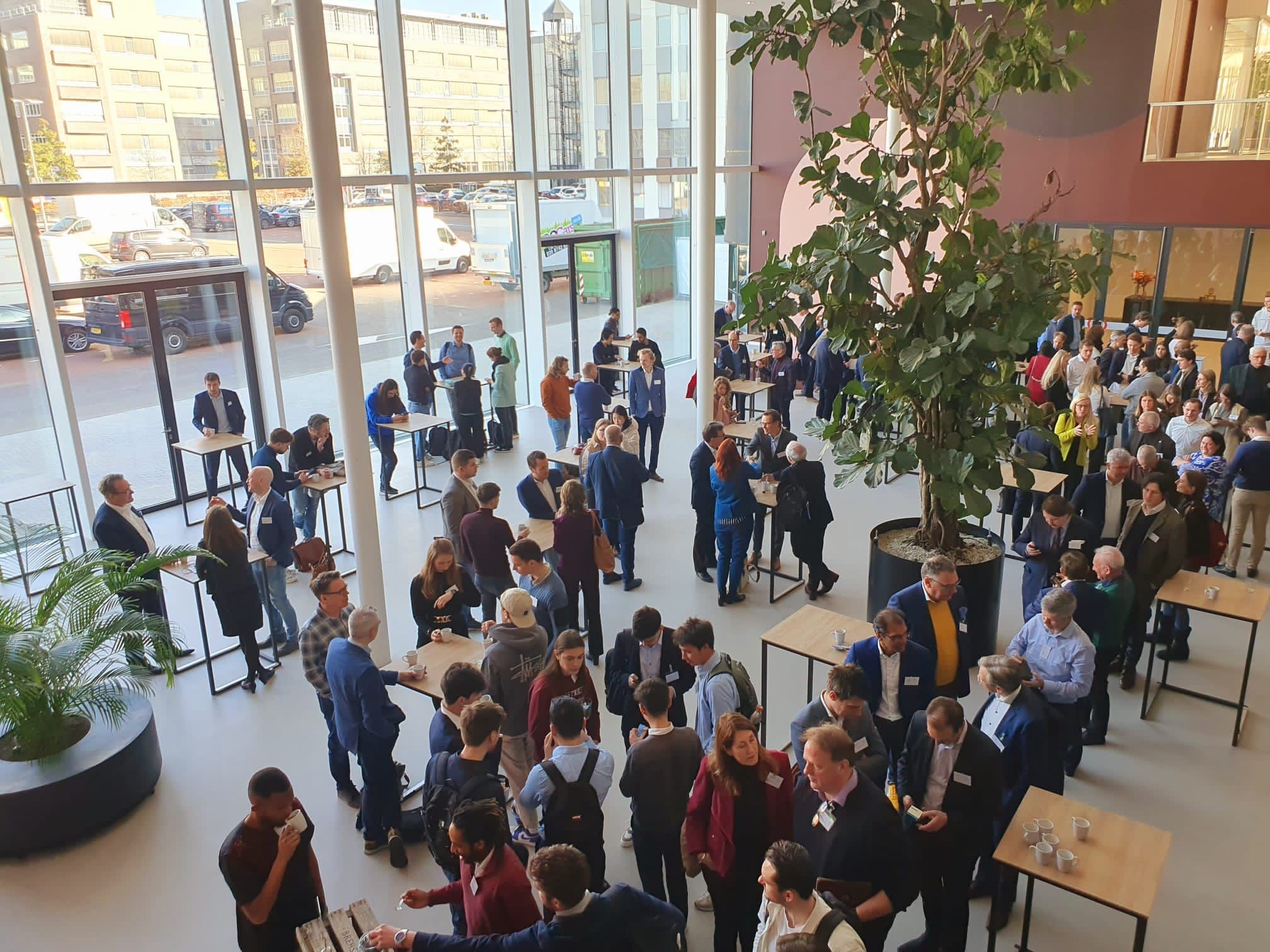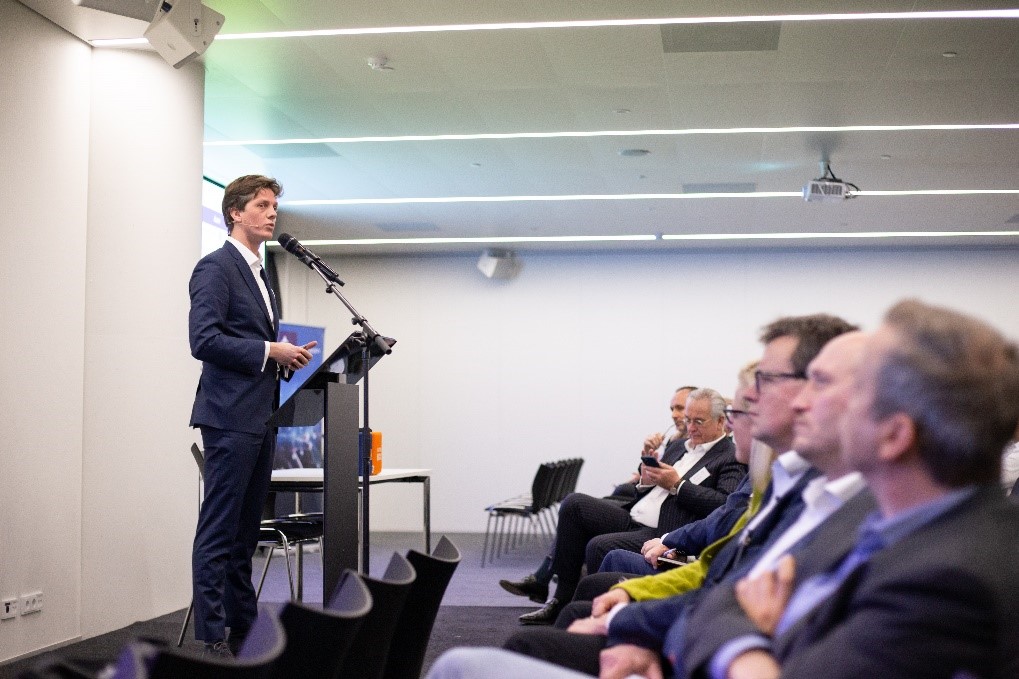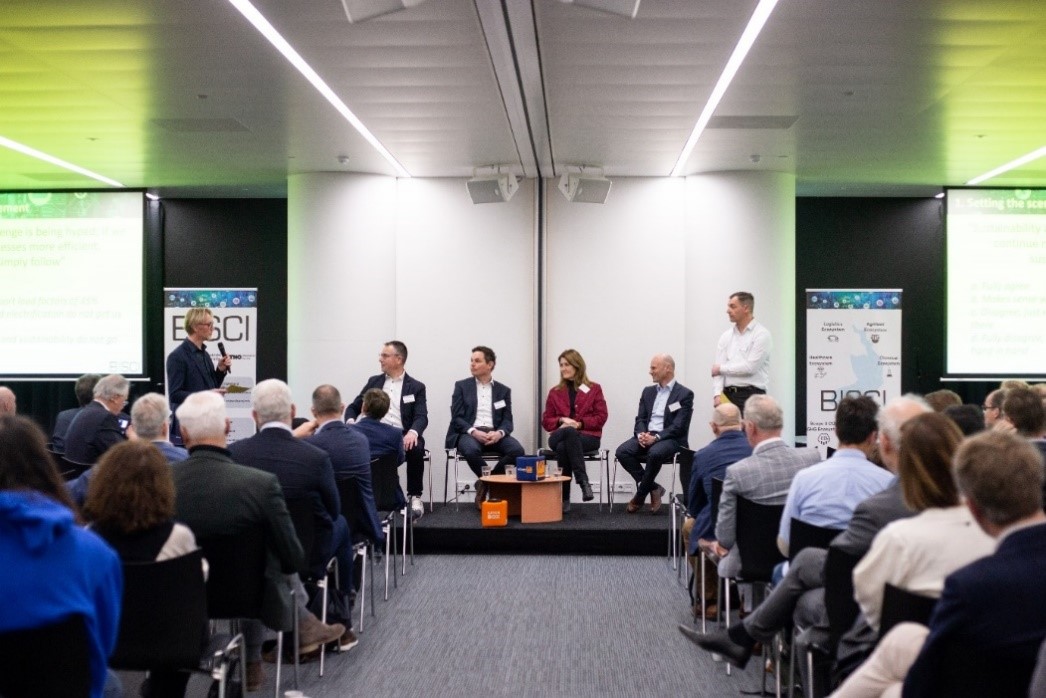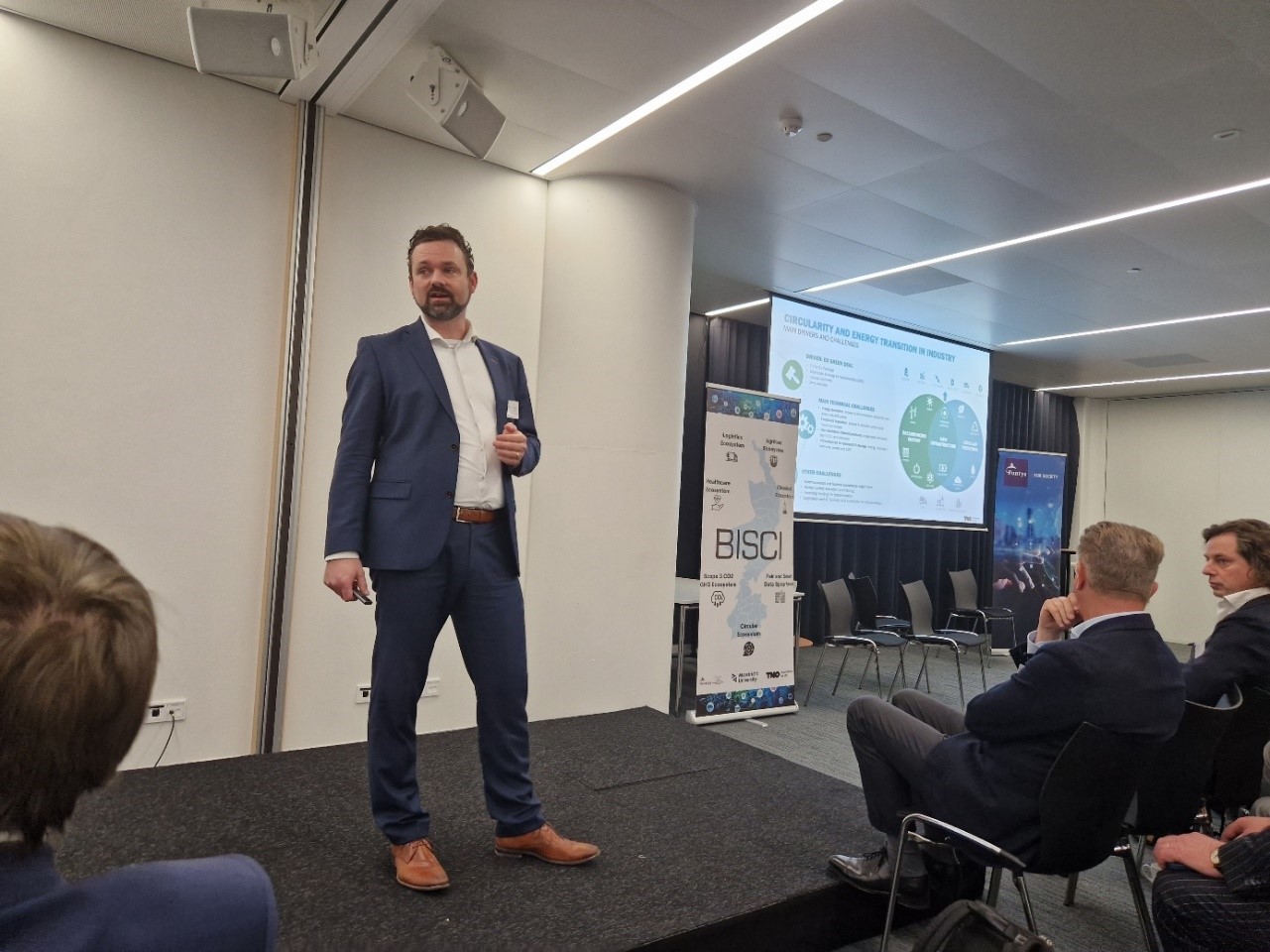The Earth Does Not Need Us, We Need Her
− 0 min readBrightlands Institute for Supply Chain Innovation (BISCI) organised the Event 'Dare to Be Circular' at the MECC in Maastricht on Thursday, 2nd March.
Limburg, partly through the pooling of knowledge and entrepreneurship of BISCI, has already taken several steps in making supply chains more sustainable and circular. Results of 3 years of research and knowledge from the network came together at this event. BISCI is the partnership of Maastricht University (UM), TNO and Fontys Hogeschool Techniek en Logistiek (Centre of Expertise KennisDC Logistiek) co-funded by Province of Limburg.
-
The world is changing rapidly and much more is going to change in the coming years. Global goods flows and supply chains are at a tipping point. From old-fashioned thinking in chains in which goods are transported from A to B as cheaply as possible, we see a shift towards more intensive cooperation within smarter chains in which digitalisation, data and sustainability play an increasingly important role. Due to, among other things, a scarcity of raw materials and rising energy prices, companies and governments are forced to work together to achieve sustainable supply chains.
Presentations from the day
-
Dare to be Circular
Upon entering, we are surprised by the large group of attendees from top management of the business community to international students, teachers and researchers. It is clear from the great enthusiasm of more than 200 participants that the theme is alive and people are working hard on it. From scientific research to practical examples are part in the first talks of the day.

Knowledge and Entrepreneurship
A little after nine o'clock, Ton Geurts, Business Director of BISCI, addressed a word of welcome on behalf of the partners UM, TNO and Fontys. Prof Dr Mariëlle Heijltjes, Dean of Maastricht University School of Business and Economics also welcomed everyone and passionately presented her vision of broad cooperation on social impact.
Building Bridges
Prof Dr Bart Vos, Scientific Director of BISCI, takes us through BISCI's activities over the past 3 years. Projects in collaboration with major partners such as VDL, Solidaridad, Wessem Port Services Group, Rabobank and Chemelot reflect the extensive portfolio. According to Bart, BISCI's strengths lie in building bridges to make big impact in research, education and business.


Fair Trade
Do African farmers receive fair prices for their coffee? Elsa Scholte, Global Communications Director of Solidaridad presented the Fair and Smart Data project. Within this project, BISCI and Solidaridad analyse data from coffee supply chains to make these chains fairer. Through Solidaridad's Fair Trade initiatives, small farmers do get a fair price for their coffee beans. Another initiative is ACORN, about which Jelmer van de Mortel, Head of ACORN, gives Rabobank's vision and application of circular economy. The Solidaridad Network, Rabobank and Microsoft have joined forces within ACORN to capture data in global chains so that an earned and fair return is realised for the smallholder farmer.

From Fossil to Renewable
Avantium develops innovative solutions for the chemical industry. For example, Avantium has developed a replacement for plastic consisting entirely of plant material, namely FDCA. This is a sugar-based raw material used to make PEF, a 100% plant-based bioplastic. PEF is used for bottles, packaging, films, fibres and textiles, among other things. The great advantage is that this type of plastic can be reused without limit and no emissions are released during production. Tom van Aken, CEO and Founder of Avantium sees great opportunities for his scale-up company and believes in a future with circular materials. Avantium will produce FDCA in a plant under construction in Delfzijl, the Netherlands, which will produce 5 kilotonnes of plastic per year. In addition, Avantium will sell licences to large plastic producers that can use its technology to produce bioplastics.
The Key Role of Logistics in a Sustainable World
After two great global examples, we return to our own Province of Limburg. In particular, developments in logistics and supply chain management in Limburg were discussed in the first break-out session. All attendees were welcomed by Gerwin Zomer, Programme Director Logistics at BISCI and Prof Dr Victor Verboeket, Lecturer Supply Chain Innovation at Fontys Centre of Expertise KennisDC Logistiek. With a panel of experts from the field, taking a look into the future, the panel consisted of Eline Oudenbroek of Interface, Marcel Koks of INFOR, Sylvester van der Logt of Seacon Logistics and Bob Joosten of Wessem Port Services Group.
The panel agreed that sustainability within the logistics sector is neither hype nor a consequence of making processes more efficient. Decisions based on efficiency and cost will remain, but the concept of sustainability and environmental impact will be added. Driving factors behind sustainability are often changing customer and government requirements. The intrinsic motivation and realisation that sustainable business is the only way forward is gaining a place within the strategy of more and more entrepreneurs.
Of course, the audience was also enthused to share and gain their knowledge through a BISCI quiz. Questions on infrastructure, renewable energy and modern technology in the region were presented. After the quiz, the panel discussed the value of collaboration and sharing data and resources. New technology, digitisation of-and therefore making chains transparent-is going to play an even bigger role. When asked whether real-time transport planning will become a reality in the coming years, the majority indicated their agreement.

Green Deal, A Decisive Decade
After a well-prepared lunch, attendees gathered back in the plenary hall. Martijn Stamm, Director Mobility at TNO spoke about the Green Deal and targets from the EU in reducing emissions.
'We need three earths in 2050 to provide us with the required raw materials.' - Martijn Stamm, TNO
We are living in a decisive decade. To combat global warming, we need to take action now in Europe but also globally to reduce greenhouse gases. Only then will we achieve the 90% reduction by 2050. Emissions are harmful to the environment, the climate and public health. Martijn advocates the creation of ecosystems like BISCI in which there is intensive collaboration within supply chains, with suppliers, customers, governments and knowledge institutions to make the entire supply chain more sustainable with the aim of reducing scope 3 emissions, which account for up to 75% of a product's total emissions. "For the Green Deal to succeed, we need to set common goals, work towards a green environment and step out of our comfort zone."

The Role of Government & Society in a Circular Economy
During the Chemical breakout session, panel members Guy de Sevaux (Invest-NL), Anton van Beek (the Dow Chemical Company), Loek Radix (Chemelot), Marc Spekreijse (Circular Plastics NL) discussed the above topic. For instance, it was stressed that we need to make products without emissions in a circular supply chain. For example, in the chemical industry, 30% is emitted during the production of the product, while the remaining 70% is in the product itself. This shows that the circularity aspect of chemical products plays an important role in the product lifecycle. In addition, the scale at which circularity should be applied is huge in the chemical industry. It was also mentioned that today's value is not tomorrow's value and therefore companies need to constantly evaluate their value proposition.
Bio-Based-Circular (BBC) is a proposal for the Growth Fund (NGF) which promises to make significant strides in circularity in the chemical industry. The aim of the BBC programme is to set up at least 5 'value circles' at scale for bio-based materials in the Netherlands. This concerns biobased raw materials (from the Netherlands and internationally), new chemical building blocks, biobased materials, circular design of applications/products, reuse and recycling, logistics and all supporting activities (such as financial support, techno/eco/social evaluation). The opportunities for BISCI are numerous, but need to be further elaborated in the coming year. As a 'key take-away', each panellist was able to clarify why circularity is important and that small steps are needed to be part of this journey. `

Measures in Greenhouse Gas Reduction at a Glance.
During the breakout session Greenhouse Gas & Circular Economy, moderator Ton Geurts (BISCI) started the discussion with the World Overshoot Day. This is the date when our earth has used up all its resources for the year without being able to recreate it itself. If all of humanity consumed as we do in the Netherlands, we would already be empty-handed on 12 April. After the first proposition, the panel was introduced. Panellists this time were Laurent Beuselink (the sustainability consultancy ERM), Dieuwertje Ewalts (Deloitte), Matthieu Risgallah (Dundee Precious Metals) and Dick Velings (Eneco). This was followed by four topics: markets, implementation, regulation and circular economy which were discussed with the panel members. During the discussion, it became clear that climate neutrality by 2050 is mandatory legislation, where it is important to establish the baseline of e.g. CO2 consumption.
Several challenges were mentioned such as the different types of "sourcing", making it difficult to provide a continuous supply of resources with circularity. However, benefits could include improved resilience through less dependency (less burdened by gas prices) and attracting young professionals). Finally, Dick Velings remarked "we just have to do it". It became clear that a change is inevitable, but at the same time, circularity will completely change the way we work together in supply chains. One of the most discussed but still open questions, however, is "Who is responsible?"
"You need social goals as an organisation and you need to make impact, otherwise you won't get good young professionals." - Ton Geurts, BISCI
Working Together With a Common Goal is Fun
The 'wrap-up' of the day was done by Prof Dominik Mahr of Maastricht University, School of Business and Economics. He aptly articulated the essence of the day as an engaging day of insightful keynotes, knowledge sharing, interactive in-depth breakouts and fun quizzes. Passion and genuine concern for the planet and people were at the heart of many discussions. The moderators of the breakouts got to share their experiences once again. Taking each other into the sustainability story about why, with whom and when is a key take-away from the day and facing the challenges together can also be a lot of fun and produce great results.
Brightlands Institute for Supply Chain Innovation
Our world can be so much better! Climate change, rising energy costs and the enormous pressure on healthcare make us even more aware of this. By combining knowledge and entrepreneurship and working together smartly, four Brightlands innovation campuses in Limburg prove every day that things can be done differently. 30,000 Brightlands optimists believe you can make chemistry and chains more circular, health more personal, food healthier and data safer and more humane.
The Brightlands Institute for Supply Chain Innovation (BISCI) develops smart and sustainable innovations. Using the latest research findings in logistics, BISCI solves challenges faced by regional and international logistics service providers. Besides science, BISCI draws its strength from collaborations with public and private partners and their networks. In addition, BISCI trains a new generation of logistics professionals who can contribute a lot to supply chain innovations in the logistics sector. BISCI has designated 4 ecosystems in Limburg, namely: Logistics, Chemical, Greenhouse Gas & Circular Economy and Healthcare.
-
Authored By:
Michiel Kuijer
Ayrton Wouters
